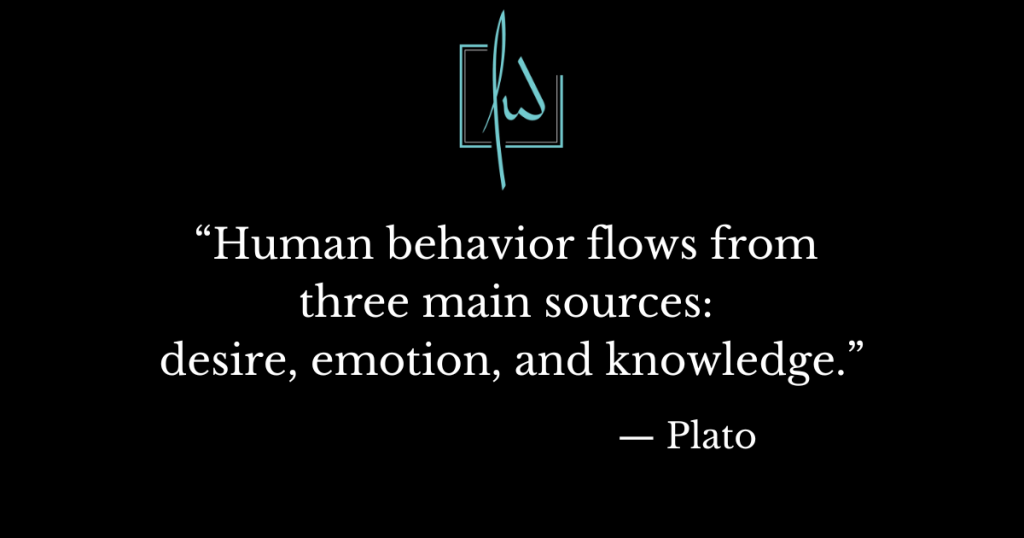
Every week, you’ll get insights and actionable steps to develop yourself physically, mentally, and emotionally
What do you want?
Those deep, inner cravings of your heart. Those intense longings of your soul.
Why do you want them?
What are they fulfilling for you, giving to you, providing for you?
Why do you do the things you do?
What is motivating you, driving you, compelling you to act?
At the epicenter of all of your wants and actions are your desires.
Your desires are the emotional wants, longings, and cravings of your innermost being and it is from these desires that we act.
• You want to be loved and appreciated.
• You long to be valued and applauded.
• You crave to be happy and content.
• You desire positive, emotional stimulation.
Desires are rooted in your emotions. All of your deepest desires create positive feelings when you think about them.
THE PROBLEM
To actually experience our deepest desires there will be negative realities we must face and embrace.
• To experience love is to risk rejection.
• To experience success is to embrace the toil, anxiety, and pain points of climbing the mountain.
• To experience bliss is to walk the path of hell to taste the pleasures of heaven.

Plato seems to be saying that behavior is driven by emotions (what you long to feel), desires (those emotions become articulated with words into descriptions), and then knowledge (the information that would tell us how to behave in order to turn our emotions and desires into reality).
For example:
Emotion: “I want to feel happy”
Desire: “A pony would make me feel happy; I want a pony”
Knowledge: “I must ask mommy and daddy for a pony for my birthday and then beg and beg until they are worn down and give in to my pleadings.”
Back to the Problem.
Let’s say you desire to feel good physically (you come to a realization that you don’t feel good physically: you’re tired, out of shape, lethargic, arthritic, etc. and you see people who appear to be healthy and fit living positive and emotionally stimulating lives and you desire that feeling).
You frame your emotion into an articulated desire to feel good physically with words like dieting, stretching, working out, walking, eating healthier, etc.
You then seek the knowledge to make this happen (YouTube videos, blogs, personal coaching, a gym membership, etc.)
This is the first part of knowledge.
But then the second part of knowledge happens.
This second part is called experiential knowledge and it is where most failure occurs.
It’s the knowledge of experiencing negative emotions in the pursuit of your deep desire (the pursuit of positive emotions).
And now you have a dilemma.
Your ultimate desire is to feel good!
These emotions manifest in an articulated desire to lose weight and become more active, healthy, and attractive.
But as you take the actions to bring your desire into reality your other desires fight against this desire.
The desire to sleep in and not go to the gym.
The desire to eat out and not pack your meals.
The desire to crash on the couch after work binging Netflix instead of walking.
We all have desires and at the root of every desire is the longing to feel positive emotions.
Most failure happens because we fail to embrace the negative emotions (work, discipline, pain, toil, etc.) necessary in order to experience the higher, positive emotions of success (weight loss, body transformation, etc.). Instead, we gravitate towards the lesser, more short-term positive emotions (snacking, eating out, being lazy) because those temporary, emotional experiences and pleasures are right in front of us, tempting us to feast on them.
So how do we win?
We remember.
The negative emotions are still there with those short-term positive emotions. Think about how you feel the morning after a huge cheat meal that sabotaged your diet. Think about how you feel when you break a streak of being physically active for weeks. Think about the feelings you experience when now you have to embrace failure because you caved to a short-term pleasure.
Now think about what you truly, deeply desire.
Ask yourself the opening questions: What do you want and why do you want it?
Spend time articulating these desires as clearly as possible.
Personal Desires: What is your physical body look like and how does it feel and function?
Financial Desires: What kind of home do you live in? What cars do you drive? What things occupy the interior of your home? How much money do you make? How much money do you give away and what does using your money for the good of others look like?
Vocational Desires: What kind of work do you do? What does your work week look like? What do you spend most of your time doing? What does success at work look like? How much vacation do you take a year and what do these vacations look like?
Relationship Desires: Are you married? Do you have kids? What does your marriage look like? How is it growing in depth, passion, and intimacy? How do you spend intentional time with your kids? Whom are your closest friends and what does time with them look like? What does your relationship with your parents and siblings look like?
There are more areas you can dive into but here’s why I’ve listed a few:
How do your desires in each of these categories help serve or hinder each other?
Each one of your desires is a piece of the puzzle forming the grandiose picture of your life. Some puzzle pieces will be larger and more significant than others. Be honest about this because you only have so much time in a day and a week and a life. You can’t work 80-hour work weeks, spend two hours of intentional time every night with your kids, spend another two hours a night focused on your spouse, and hit the gym for two-hour workouts. Well, maybe you could if you forego sleep, but you’d last a week and then fail miserably at all these endeavors.
Be honest with your emotions.
Clarify your desires.
Prioritize and then align your desires to create a picture of your life that you will now work to bring into reality.
And don’t fall prey to short-term, lesser-than pleasures. These are not your desires. They are sabotaging your ultimate desires.
Know what you want and then chart the path to get there.
That’s the topic for this coming Wednesday: Goals — How to make a plan to bring your desires into reality.
See you then.